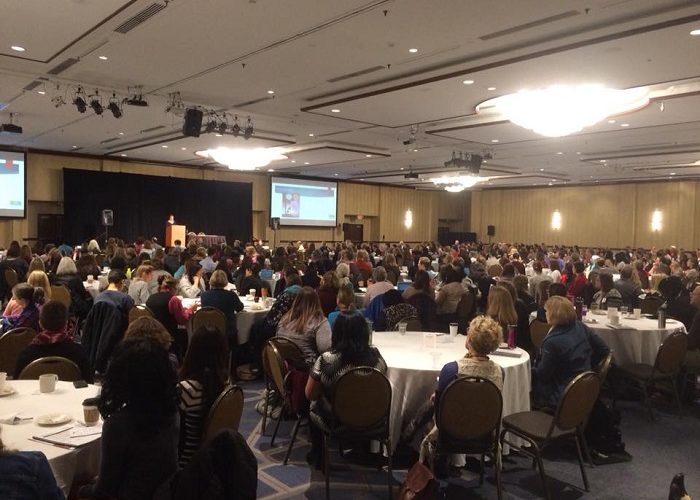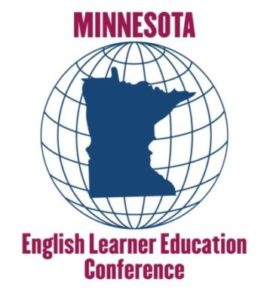- MN ABE Connect
- Archive
- MELEd 2019: Sharing What We Learned at the State ESL Conference – Part I
 December 17, 2019
December 17, 2019
MELEd 2019: Sharing What We Learned at the State ESL Conference – Part I
Compiled by Patsy Egan, Director In late November 2019, ATLAS provided scholarships for 18 ABE teachers to attend the state ESL gathering (MELEd) in St. Paul. MELEd is the two-day Minnesota English Learner Education conference put on by MinneTESOL, Minnesota Teachers of English to Speakers of Other Languages, in partnership with the Minnesota Department of Education. This annual conference draws over 1100 ESL educators from around the state, working in K-12, college, and adult learning contexts! Below are some of the main takeaways from our ABE colleagues from their time at MELEd.
In late November 2019, ATLAS provided scholarships for 18 ABE teachers to attend the state ESL gathering (MELEd) in St. Paul. MELEd is the two-day Minnesota English Learner Education conference put on by MinneTESOL, Minnesota Teachers of English to Speakers of Other Languages, in partnership with the Minnesota Department of Education. This annual conference draws over 1100 ESL educators from around the state, working in K-12, college, and adult learning contexts! Below are some of the main takeaways from our ABE colleagues from their time at MELEd.
Erin Cary, Lyndale Neighborhood Association, Minneapolis
One of the things I always enjoy about being at a conference like this is the chance to connect with fellow educators and learn more about what they are doing in their contexts.
A workshop that stood out to me was Expository Writing and the Challenged Writer: Solutions for Conceptual Understanding (Samuel Rodriguez, PhD.). Dr. Rodriguez described some key elements required for helping elementary and high school students develop strong writing skills and offered great tips for what to focus on and how to manage a writing classroom without resorting to, as he described, a “conveyor belt” approach. Though the issues discussed are not immediately relevant to my context, Dr. Rodriguez’s ability to inspire his listeners and draw us into the type of classroom culture that he creates with his own students was really engaging and reinforced the concept that classroom culture is key to the effectiveness of a learning environment.
During the Adult Interest Section Meeting, we were made aware of a number of online resources to help familiarize our students with Census 2020 and encourage them to participate (Census.gov, National Coalition for Literacy, and Los Angeles Unified School District [census curriculum]). I plan to refer to these websites when planning an upcoming Census Unit.
Vicki Disrud, Monticello ABE, MN
I really enjoyed all the sessions I attended. The session that really stood out to me and connected with how I have been thinking about teaching differently was Critical Thinking for ALL learners. I teach in a one-room schoolhouse setting and had been contemplating how to teach critical thinking skills to many-leveled students in a way that is more fun and less dry. Presenter Adam Kuehnel demonstrated his approach by showing us different projected puzzling pictures.
The example I found most fun and interesting was a picture of a city map we knew nothing about. We were given eight points of instruction for investigations. First we had to look at the representation, then say what we were looking at through evidence. Next we had to locate and circle the Work House and Brewery. Then circle every pump in the layout. After this we were asked to think about the relationship between pumps, what we circled, and bars of black lines in various locations on the map. After all of this we were asked to form a hypothesis formed by our evidence. We found out the bars of lines were actually dead bodies! That was an entertaining and shocking laughing point. At the end we found out it was a picture of London and the British Pub where John Snow discovered the deaths were the result of a cholera outbreak. There were so many levels and facts to think about and learn with this fun example! Also, this and some of the other sessions I attended, plus the keynote speaker, Ofelia Garcia, really made me think about bilingual learning in a new and different way.
Stephanie Sommers, Minneapolis Adult Education
I attended a session by Mari Bodensteiner from the University of WI, Eau Claire. The session focused on creating communicative grammar activities. I liked Mari’s session because it was very hands-on, and Mari had a unique way of reframing “tried and true” classroom activities so that they felt fresh and new. For example, Mari talked about playing the game “Two Truths and a Lie” with her learners, but in Mari’s version, all of the sentences that the learners share have to use specific grammar structures, such as being complex or conditional sentences.
Another thing that I appreciated about Mari’s session was that she designed it to share three of her favorite communicative grammar activities, and then she also shared three ways in which teachers can make common grammar lessons from textbooks more communicative. She gave an example of how she has modified a common textbook lesson about giving directions around town. Usually for these types of lessons, the textbook provides a map of a generic downtown with a Main Street and some businesses. Mari shared the idea of having the teacher bring in a local map or pictures of the local downtown, and using those familiar materials to practice giving directions. She suggested that this activity could be extended by having students bring in pictures of their favorite places, and then practice giving directions for how to get there.
You’ll hear more from ABE participants in the January 14, 2020, Part II of this article! And if YOU teach English, you’ll want to be sure and join ATLAS for its largest event, the Language & Literacy Institute on January 23-24, 2020, in Minneapolis. See details and register here! https://atlasabe.org/event/2020-language-literacy-institute/
Newsletter Signup
Get MN ABE Connect—the official source for ABE events, activities, and resources!
Sign UpArticle Categories
- ABE Foundations/Staff Onboarding
- ACES/Transitions
- Adult Career Pathways
- Assessment
- CCR Standards
- Citizenship
- COVID-19
- Cultural Competency
- Digital Literacy/Northstar
- Disabilities
- Distance Learning/Education
- ELA
- Equity/Inclusion
- ESL
- HSE/Adult Diploma
- Listening
- Math/Numeracy
- Mental Health
- Minnesota ABE
- One-Room Schoolhouse/Multilevel
- Professional Development
- Program Management
- Reading
- Remote Instruction
- Science
- Social Studies
- Speaking/Conversation
- Support Services
- Teaching Strategies
- Technology
- Uncategorized
- Volunteers/Tutors
- Writing